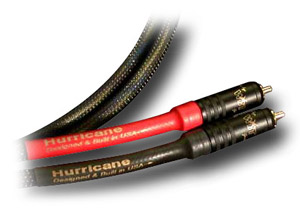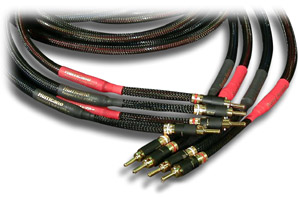![[SoundStage!]](../titles/sslogo3.gif) Home
Audio Home
Audio Equipment Review |
|||||||||||||||||||||
March 2001 Sonic Horizon Hurricane Interconnects, Speaker Cables, and Power Cords by Roger Kanno
What, cables again?! Before I begin, let me say that I believe cables do make a difference in the sound of a system. I don't know exactly how or why, but in my experience they do. That being said, the changes in sound quality are more in line with that of a tweak (i.e., quite small) than the more obvious changes usually associated with replacing electronics or speakers. While many will balk at the idea of spending hundreds, or even thousands of dollars on cables, a high-performance audio system will require at least some investment in cabling to realize the system's full potential. Sonic Horizon cables are the work of Harry Maybrun of audio retailer HCM Audio. Harry, who has sold his own cables through HCM Audio on a limited basis, is now manufacturing a complete line of audio, video, and power cables under the Sonic Horizon brand name. His products consist of nearly every type of audio and video cable at a wide variety of price points and are only available direct from Sonic Horizon. Like most other factory-direct products, they come with a money-back guarantee, and by selling direct to the consumer, Sonic Horizon offers high-quality, high-value cables utilizing top-quality materials and construction techniques at reasonable prices. The cables that were provided for this review consisted of the Hurricane speaker cables, interconnects, and power cords, which fall directly in the middle of Sonic Horizon’s product lineup. There are two model lines above and two below in terms of pricing. Description
All Sonic Horizon products are constructed of high-quality materials. The power cords are terminated with Hubbell hospital-grade plugs and Schurter IEC connectors and also include a ferrite clamp on either end to help combat RF interference. WBT connectors are used on both the speaker cables and interconnects. These cables appear quite solid, with quality termination and decent fit and finish giving them a sturdy, professional appearance. Just prior to the publication of this review, we were informed by Sonic Horizon that an improved version of the Hurricane power cord was available. It features a slight modification to the grounding scheme and the replacement of the Schurter IEC with a WATTaGATE 320 IEC. The price remains unchanged. The Sonic Horizon cables use fairly common but proven construction techniques and materials for the most part, such as polyethylene and air dielectrics, silver-plated copper conductors, and a woven polyethylene terephthalate outer sleeve. Although many of these techniques and materials are given high-tech-sounding names that are not well explained in the Sonic Horizon promotional materials, they are nonetheless impressive for products in this price range.
Another feature of the Sonic Horizon cables is the practicality and functionality of their design. All of the cables are relatively lightweight, thin, and flexible, which makes them ideal for use where space may be limited, such as a complex home-theater system. Even the Hurricane power cord, which has an 11-gauge conductor, is relatively flexible and easy to use. The prices of the Hurricane cables are extremely competitive. The interconnects are priced at $100 USD per one-meter pair, 8' speaker cables at $300, and two-meter power cords at $190 each. Most other manufacturers charge you more and give you less in terms of construction techniques and materials. Of course, all of this care and effort taken in design and construction means nothing unless it can be backed up with commensurate performance. The sound The overall sound of the Sonic Horizon Hurricane cables can best be described as warm, but otherwise balanced and enjoyable. The detail and transparency of the cables were good, with just a slight richness in the bass being their only noticeably objectionable coloration. The interconnects and speaker cables did have a slight sound to them that was pleasant and easygoing, with the power cords imparting the least amount of coloration of the three types of cables. Even though the interconnects and speakers might not have sounded completely neutral, the combination of all the Hurricane cables provided a sound that was immediately engaging and which never became harsh or fatiguing, even after extended listening. When the Hurricane interconnects were first put into my system, I was surprised by how good they sounded. In fact, I used them for many weeks without any inclination to reinsert my more expensive, reference Nordost Blue Heaven interconnnects. The sound was darker and more harmonically rich, but it was pleasing just the same with vocals benefiting tremendously. Listening to Ani DiFranco’s Up Up Up Up Up Up [Righteous Babe RBR013-D] revealed the Hurricane interconnect’s smooth sound and uniform imaging and soundstage. DiFranco’s vocals on "Tis of Thee" were bold and powerful, as was her guitar, which although forceful, never became overbearing as strings sometimes have a tendency to do. Doug Schneider may favor DiFranco’s "Everest" from the same album as a test of soundstage depth, but I find the more closely miked and prominent guitar work of "Tis of Thee" to also be invaluable for critical listening. Nevertheless, vocals on both of these cuts were imbued with a wonderful silky smoothness. The Hurricane interconnects may have surprised me, but the speaker cables further captivated me with a midrange that was sweeter than anything I had previously heard from my system. DiFranco’s powerful vocals took on a liquid character that was intoxicating. These speaker cables exhibited an even warmer and richer sound than the interconnects, which sometimes had the unwanted effect of softening the bass. As a result, CDs such as Peter Gabriel’s Ovo [Real World PGCD9] had plenty of deep bass, but lacked some control and definition. However, the magic that the Hurricane speaker cables performed on vocals could make me overlook this shortcoming. Whether it was DiFranco, Eva Cassidy’s Live At Blues Alley [Blix Street G2-10046], or Steven Page of the Barenaked Ladies on Gordon [Sire CD 26956], I could not resist the palpable sound of vocals with the Hurricane speaker cables.
Like other good power cords, the Hurricanes lowered the noise floor and made the background just a little bit quieter. Detail was enhanced, and instruments and vocals sounded airier, while the bass seemed to go deeper and was more controlled. The piano chords of Sarah McLachlan’s "Angel" from the City of Angels Soundtrack [Warner CDW 46867] had good body and timbre, and her voice was eerily realistic. The changes in sound realized with the power cords were not of the same magnitude as those of the other Hurricane cables. Additionally, these changes were different in that the power cables tended to make the sound more neutral, while the interconnects and the speaker cables tended to add more of their own sonic signature to the sound. Cables are cables, right? The Sonic Horizon Hurricane cables were a definite improvement over the stock cables that are routinely provided with some stereo components and other inexpensive, nearly no-name brands of cables. However, this should not be surprising considering their price, which can range up to several hundred dollars for the speaker cables. In general, the Hurricane cables improved all aspects of sonic performance by smoothing out the sound while still managing to add detail and depth to the presentation. In comparison to my reference Nordost Blue Heaven interconnects and speaker cables, and ESP power cords, all of which cost substantially more than the Hurricanes, there were some noticeable differences. The Nordost interconnects ($200 per meter pair) have a more transparent and faster sound that may be more accurate, but that some might find less involving. The quicker, tighter bass of the Blue Heaven might also seem lean in comparison to the richer, but looser bass of the Hurricanes. The warmer midrange of the Hurricane interconnect will also appeal to many with their seductive effect on vocals, which makes the Blue Heaven seem analytical in comparison. Both the Hurricane and Nordost Blue Heaven speaker cables ($560 for a 2.5-meter pair) share many of the same characteristics with their associated interconnects. And while the Hurricane speaker cables have an even more alluring effect on vocals than the Hurricane interconnects, I sometimes found their effect in combination with the interconnects to be a bit overwhelming, especially in the lower-bass and midbass regions. Interestingly, I found the combination of the Blue Heaven interconnects and Hurricane speaker cables to be a good match with my system by taking away some of the coloration of the Hurricanes and tightening up the imaging and detail while leaving the honey-sweet vocals intact. Overall, I preferred the more neutral sound of the Nordost Blue Heaven interconnects and speaker cables, but the Hurricanes were not far behind in terms of performance -- and at a very attractive price. The difference between the Hurricane power cords and my reference ESP A/V Power-Flow Pro power cords ($300) was a much closer call. At times I thought that the Hurricanes might have had the edge in lowering the noise floor and providing greater dynamics, but the differences were very subtle. In the end, I would say that it was a toss-up between the two power cords, both providing slightly different, but incrementally similar improvements in sound. Conclusion The general warmth of the Sonic Horizon Hurricane interconnects and speaker cables may require some careful system matching, but considering their prices, all of the Hurricane cables offer high value. The high-quality terminations by WBT, Schurter (now WATTaGATE), and Hubbell are almost unheard of at this price point, and all of the cables utilize good construction techniques and are functional and easy to use. The Hurricane power cords are perhaps the best value of the bunch, comparing favorably with more expensive power cords. The interconnects are also an excellent value with sound that is not totally neutral, but very enjoyable nonetheless. The speaker cables are the most expensive of the products and may seem like less of a bargain, but many will find their captivating effect on vocals to be irresistible. And with Sonic Horizon's money-back guarantee, giving the Hurricane cables a try in your system is easy. ...Roger Kanno
|
|||||||||||||||||||||
|
|||||||||||||||||||||
![[SoundStage!]](../titles/sslogo3.gif) All
Contents All
ContentsCopyright © 2001 SoundStage! All Rights Reserved |


